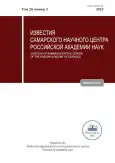Development and application of a simulation model for a compounding process for motor gasolines
- Authors: Golovina E.S.1, Khaimovich I.N.2
-
Affiliations:
- АО «Samaraneftechimproject»
- Samara National Research University named after Academician S.P. Korolyov
- Issue: Vol 25, No 3 (2023)
- Pages: 35-42
- Section: Articles
- URL: https://journals.eco-vector.com/1990-5378/article/view/624715
- DOI: https://doi.org/10.37313/1990-5378-2023-25-3-35-42
- ID: 624715
Cite item
Full Text
Abstract
Compounding commercial fuels is an important final stage of the entire production process chain in an oil refinery which defines the economic effectiveness of the company's manufacturing activities. This paper addresses a simulation model for the compounding process for commercial gasolines. The Model is based on discrete linear programming. The target function for the optimization model is the ratio of the difference between the value of the salable product and the costs incurred by manufacturing components and electrical power to the final volume of the salable product, as well as the time it takes to prepare. The optimization model leads to the conclusion about the practicability of the in-flow blending, as well as of the necessity of selecting the right pumping equipment. The optimization model can be applied to primary calculations of economic effectiveness of the various options of organizing the process for the compounding of commercial gasolines.
About the authors
Evgeniia S. Golovina
АО «Samaraneftechimproject»
Author for correspondence.
Email: GolovinaES@snhp.rosneft.ru
Graduate Student
Russian Federation, SamaraIrina N. Khaimovich
Samara National Research University named after Academician S.P. Korolyov
Email: kovalek68@mail.ru
Doctor of Technics, Professor at the Department of Metal Forming
Russian Federation, SamaraReferences
- Singh A. et al. Model-based real-time optimization of automotive gasoline blending operations //Journal of process control. - 2000. - T. 10. - №. 1. - S. 43-58.
- DeWitt C. W. et al. OMEGA: An improved gasoline blending system for Texaco //Interfaces. - 1989. - T. 19. - №. 1. - S. 85-101.
- Wang W. et al. On-line optimization model design of gasoline blending system under parametric uncertainty //2007 Mediterranean Conference on Control & Automation. - IEEE, 2007. - S. 1-5.
- Wang W. et al. On-line optimization model design of gasoline blending system under parametric uncertainty //2007 Mediterranean Conference on Control & Automation. - IEEE, 2007. - S. 1-5.
- Anosov A.A., Efitov G.L., Zusman S.D. On-line gasoline blending optimization with in-flow blend quality analysis //Automation and Remote Control. - 2017. - T. 78. - №. 3. - S. 515-524. EDN: YVMITP
- Mendez C.A. et al. A simultaneous optimization approach for off-line blending and scheduling of oil-refinery operations //Computers & chemical engineering. - 2006. - T. 30. - №. 4. - S. 614-634.
- Jia Z., Ierapetritou M. Efficient short-term scheduling of refinery operations based on a continuous time formulation //Computers & chemical engineering. - 2004. - T. 28. - №. 6-7. - S. 1001-1019.
- Li J., Xiao X., Floudas C. A.Integrated gasoline blending and order delivery operations: Part I. short-term scheduling and global optimization for single and multi-period operations //AIChE Journal. - 2016. - T. 62. - №. 6. - S. 2043-2070.
- Castillo P.A.C., Castro P.M., Mahalec V. Global optimization of nonlinear blend-scheduling problems //Engineering. - 2017. - T. 3. - №. 2. - S. 188-201.
- Golovina E.S. / Svidetel'stvo o gosudarstvennoy registratsii programmy dlya EVM № 2022680985 ot 09.11.2022. Imitatsionnaya model' tsekha kompaundirovaniya benzina.
Supplementary files






